Behold: Fierce aurora lights up the Indian Ocean beneath the International Space Station
Astronauts aboard the International Space Station got front seats to a celestial light show

Your support helps us to tell the story
From reproductive rights to climate change to Big Tech, The Independent is on the ground when the story is developing. Whether it's investigating the financials of Elon Musk's pro-Trump PAC or producing our latest documentary, 'The A Word', which shines a light on the American women fighting for reproductive rights, we know how important it is to parse out the facts from the messaging.
At such a critical moment in US history, we need reporters on the ground. Your donation allows us to keep sending journalists to speak to both sides of the story.
The Independent is trusted by Americans across the entire political spectrum. And unlike many other quality news outlets, we choose not to lock Americans out of our reporting and analysis with paywalls. We believe quality journalism should be available to everyone, paid for by those who can afford it.
Your support makes all the difference.Brilliant green flames dance above the darkened Indian Ocean in a time-lapse video taken by astronauts aboard the International Space Station (ISS).
Posted to the ISS Twitter account on Sunday, the video shows the aurora, or Southern lights as seen by astronauts on the space station. The video encompasses the Space Stations flight over the Indian Ocean all the way to the Coral Sea east of Australia.
Aurora are generated by charged particles discharged from the Sun as they are trapped and interact with Earth’s geomagnetic field. The charged particles generate the pretty lights as they transfer their energy into the magnetic field, but can also trigger a geomagnetic storm, an expansion and quivering of the field that can disrupt radio communications and even pose a hazard to satellites — in February, a geomagnetic storm pulled 40 newly launched SpaceX satellites out of low Earth orbit.
The US National Oceanic and Atmospheric Administration’s Space Weather Prediction Center had warned of the possibility of a moderate geomagnetic storm on Sunday.
Join our commenting forum
Join thought-provoking conversations, follow other Independent readers and see their replies
Comments